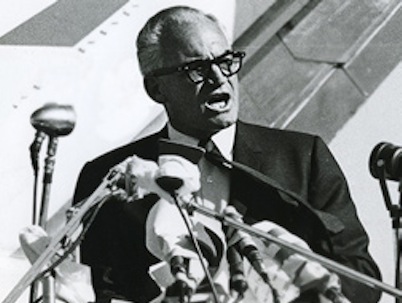Review -- Mr. Conservative: Goldwater on Goldwater
09/18/06 12:15 AM

1964 Republican presidential candidate Barry Goldwater speaks his mind. HBO photo
By ED BARK
Lionized in death, vilified in life? Barry Goldwater, branded a mad bomber in the 1964 presidential campaign, is seen in retrospect as a politician who actually had the courage of his convictions. Imagine taking positions without first filtering them through focus groups. That's right, kids. Back in the day, some public servants actually used to operate that way.
HBO's 90-minute Mr. Conservative: Goldwater on Goldwater (Monday night, Sept. 18, at 8 central, 9 eastern) views the strong-willed Arizona senator through the at times dewy eyes of his granddaughter, CC. She was five years old when he ran for president and lost in a historic landslide to President Lyndon Johnson. CC is all grown up now. As evidence, she opts to wear an attention-getting low-cut top that doesn't suit this mostly serious-minded documentary. Not that it's a federal offense or anything.
CC otherwise has gathered a very impressive array of interview subjects, most notably Hillary Rodham Clinton, Sen. Edward Kennedy and former U.S. Supreme Court justice Sandra Day O'Connor, an early acolyte.
Mrs. Clinton, a "Goldwater girl" in the 1964 campaign, says she "admired his outspokenness, his wonderful sort of Western ways and values." Sen. Kennedy is an admirer, too, not of the late Goldwater's politics but of his straight-shooting style and substance. "He could differ, but he was never personal, never vindictive."
Goldwater's book, The Conscience of a Conservative, sold an astounding 3.5 million copies. But his presidential campaign slogan, "In your heart, you know he's right," became ripe for ridicule and derision. The Rev. Martin Luther King, Jr. wasn't a fan. Goldwater's position against racial segregation but for states' rights made him a perceived arch enemy of the Deep South civil rights movement. "His election would be a tragedy and suicidal almost for the nation and the world," Dr. King said at the time.
The senator had other interests. He was an avid ham radio operator and an accomplished photographer whose pictures of Arizona's Navajo Indians remain stunningly vivid. Goldwater's relationships with his children could be problematic. Like many fathers of that era, he wasn't a big hugger or overall love-dispenser. Nor was he around that much.
"He was probably a better statesman than a father," says Barry Goldwater Jr., the spitting image of his old man. "But when you come to think of it, he was a good father."
Barry Jr., a less successful politician than his famous dad, speaks poignantly and emotionally of aiming to please and invariably falling short.
"We probably set too high a standard for ourselves," he says, his voice breaking. "We knew he loved us, but he had a hard time showing it and that probably hurt."
In later years, Goldwater supported gay rights and also was pro-choice. Both issues hit close to home. His grandson, Ty, is openly gay and his daughter, Joanne, had an abortion as a young woman. Goldwater also loathed the religious right's advances into politics and was instrumental in persuading President Nixon to resign in the waning days of Watergate.
"He enjoyed every minute of this thing, because he didn't like Nixon," says former Washington Post editor Ben Bradlee. "He wasn't sabotaging Nixon, but he wasn't doing anything to cushion his fall."
Goldwater died in 1998. His ashes, along with wife, Peggy's, were sprinkled in his beloved Colorado River.
It's appropriate then that longtime Democratic strategist James Carville sees him as "clearly John the Baptist to (Ronald) Reagan," who won the presidency in 1980 as a conservative Republican cast in the Goldwater mold.
"Some of us think Goldwater won (in '64)," says conservative commentator George Will. "It just took 16 years to count the votes."
Grade: B
